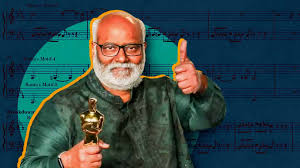Oscar-winning music composer MM Keeravani, the mastermind behind the world phenomenon "Naatu Naatu" from RRR, gave an intimate insight into his philosophy of music and creative trajectory, highlighting the endless potential that Indian classical music presents to the rest of the world.
Discovering Infinite Worlds Through Ragas
Keeravani, India's first Oscar-winning composer on an Indian production, attributes most of his innovation to the ancient and elaborate structure of ragas. He describes how most modern-day composers limit themselves to a small number of known scales, yet Indian music inherits an "innumerable wealth of scales, or ragas." To Keeravani, every raga is a gateway: "When I work or experiment with a different raga, a different world opens up. Doors open to a different part of the music, so that's how you get new ideas each time.".
This method, he avers, has kept his music contemporary and unique over decades and languages, from Telugu and Tamil to Hindi cinema, where he is also known as MM Kreem. "It's like a whole new world unfolds, enabling me to produce fresh ideas and creative notes all the time," Keeravani reveals, pointing out that the enormity of Indian classical music is an ocean—"the more you delve deeper, the richer you become.".
Recent Works and Artistic Collaborations
Keeravani is currently working on the highly awaited film Hari Hara Veera Mallu, featuring Pawan Kalyan, a project that he calls a "five-year odyssey." He commends director Jyothi Krishna's hands-on approach and producer A.M. Rathnam's controversy-free, lyric-writing skills. Keeravani also gives credit to the team effort with lyricist Rambabu and Nidhhi Agerwal's performance.
In the times to come, Keeravani is involved in Anupam Kher's directorial return with Tanvi The Great and Neeraj Pandey's Auron Mein Kahan Dum Tha, symbolizing the beginning of a new era where he wants to embrace his full identity as the "crème de la crème" of his craft, going beyond the MM Kreem tag.
A Legacy Born of Humility and Innovation
Though acclaimed globally—having received the Padma Shri, Golden Globe, and Oscar—Keeravani is still earthy. He shuns grand celebrations and instead likes quiet satisfaction and ongoing creative work. "If I celebrate my success, it might put me into a good mood at the time. But later, when you encounter a failure, it will put me into depression also. So, I don't celebrate my success nor do I get into any depression when I encounter failure. I'm satisfied with whatever is going on. It's a good feeling, but that's all.". At best, I shall walk to the bakery and purchase some croissants," he states.
Keeravani's soundtracks are a combination of classical ragas, folk forms, and Western orchestration, always in the interest of the emotional essence of the film. He attributes his real-life experiences—instead of mere musical expertise—for the maturity and authenticity in his scores. "My strength lies in my life, not my musical acumen," he reflects.
Global Recognition and the Journey Ahead
Keeravani’s Oscar win for “Naatu Naatu” is not just a personal milestone but a moment of pride for Indian music and culture. He believes this recognition will open doors wider for the world to embrace Indian music, culture, and literature: “We are no less than any other culture in the world”.
As he continues to innovate and inspire, Keeravani’s journey stands as a testament to the transformative power of music—and the infinite worlds that open up with every raga.
Relevant Sources: Free Press Journal, Hindustan Times, Indian Express, Open Magazine, iMeUsWe, Indian Express Sunday Eye, Times of India, Economic Times]

